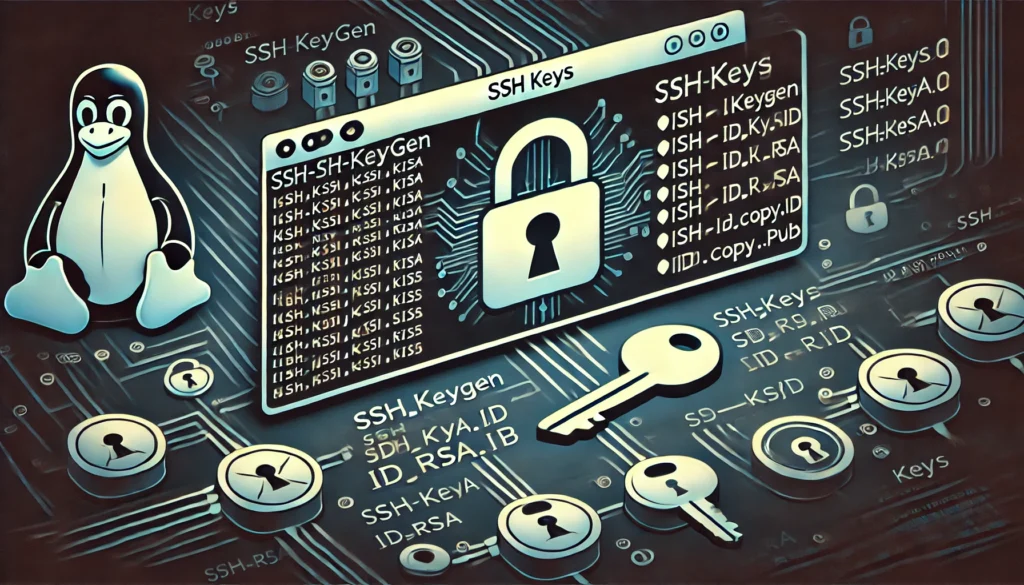Understanding SSH Keys in Linux: A Comprehensive Guide

Secure Shell (SSH) is a widely-used protocol that provides a secure method for remote login and other network services over an unsecured network. SSH keys are a critical component of SSH that enhance the security and convenience of authenticating to remote systems. In Linux, SSH keys are often used to replace traditional password-based logins, offering a more secure and automated method of authentication. This article will provide a detailed exploration of SSH keys in Linux, explaining their importance, how they work, and how to use them effectively.
What Are SSH Keys?
SSH keys are cryptographic keys used to authenticate secure communication between a client and a server. They are a pair of files, typically named id_rsa (private key) and id_rsa.pub (public key), that are generated by a user on their local machine. The private key is kept secure on the client machine, while the public key is placed on the server to which the user wants to connect. When the user tries to log in, the SSH protocol uses these keys to establish a secure and authenticated connection.
Why Use SSH Keys?
SSH keys provide several advantages over password-based authentication:
- Enhanced Security: SSH keys use public-key cryptography, which is much harder to crack than a traditional password. Since the private key is never transmitted over the network, it is more secure than passwords that can be intercepted.
- Convenience: Once SSH keys are set up, users can log in to remote servers without needing to remember or enter a password. This is especially useful for automating scripts or tasks that require frequent remote access.
- Mitigation Against Brute Force Attacks: SSH keys are less vulnerable to brute force attacks because the authentication process does not rely on passwords.
- Customizable Access Control: SSH keys can be tied to specific commands or actions, giving administrators granular control over user access.
How SSH Keys Work
SSH keys operate using public-key cryptography, where one key is used for encryption and another for decryption. Here’s how the process works:
- Key Pair Generation: The user generates an SSH key pair using a command like
ssh-keygen. This command produces two files: a private key (kept secure) and a public key (shared with the server). - Public Key Distribution: The user copies the public key to the remote server’s
~/.ssh/authorized_keysfile. This file contains a list of public keys authorized to access the server. - SSH Connection: When the user initiates an SSH connection, the server checks if the user’s public key is listed in
authorized_keys. If it is, the server generates a challenge encrypted with the public key. - Authentication: The client decrypts the challenge using the private key. If successful, it proves ownership of the corresponding private key, and the server grants access.
Generating SSH Keys in Linux
Creating SSH keys in Linux is a straightforward process. Here’s a step-by-step guide:
- Open the Terminal: SSH key generation is done through the command line. Open your terminal to begin.
- Generate the Key Pair: Use the
ssh-keygencommand to generate a new SSH key pair:
ssh-keygen -t rsa -b 4096 -C "your_email@example.com"
-t rsaspecifies the type of key to create, which is RSA in this case.-b 4096sets the key length to 4096 bits, making it more secure.-C "your_email@example.com"adds a comment, typically your email, to the key for identification.
Choose a File Location: The command will prompt you to specify a file location for the keys. The default is ~/.ssh/id_rsa, which is generally recommended unless you have specific needs.
Set a Passphrase: You’ll be asked to enter a passphrase. This adds an extra layer of security, protecting the private key with a password. If you prefer no passphrase, press Enter twice, but be aware of the security implications.
Key Pair Generated: After completing these steps, your key pair will be generated. You’ll have two files: id_rsa (private key) and id_rsa.pub (public key).
Types of SSH keys
In Linux, there are several types of SSH keys, each based on different cryptographic algorithms. The choice of SSH key type depends on factors like security requirements, compatibility, and personal or organizational preference. Here are the main types of SSH keys used in Linux:
1. RSA (Rivest-Shamir-Adleman)
- Description: RSA is one of the most widely used algorithms for SSH keys and digital certificates. It supports key lengths typically ranging from 2048 to 4096 bits.
- Security: RSA is generally secure, especially with longer key lengths (e.g., 4096 bits). However, it is slowly being phased out in favor of more modern algorithms due to concerns about its long-term security against quantum computing.
- Usage: Commonly used in many systems and is supported by most SSH implementations.
2. DSA (Digital Signature Algorithm)
- Description: DSA was one of the first algorithms standardized for SSH keys. It uses a fixed key length of 1024 bits.
- Security: DSA is considered less secure than RSA and ECDSA due to its smaller key size and other weaknesses. It’s no longer recommended for use.
- Usage: Its use is discouraged, and many systems have deprecated support for DSA keys.
3. ECDSA (Elliptic Curve Digital Signature Algorithm)
- Description: ECDSA uses elliptic curve cryptography to create smaller, faster, and more secure keys compared to RSA and DSA. Common key lengths are 256, 384, and 521 bits.
- Security: ECDSA offers strong security with smaller key sizes, making it efficient and suitable for environments with strict resource constraints.
- Usage: Increasingly popular due to its efficiency and strong security properties.
4. ED25519
- Description: ED25519 is a specific instance of the EdDSA (Edwards-curve Digital Signature Algorithm) using the Edwards curve. It’s designed to be secure and efficient.
- Security: ED25519 is considered highly secure with a fixed key length of 256 bits. It is resistant to side-channel attacks and provides fast signing and verification.
- Usage: Favored for its security, speed, and simplicity. It is recommended for new SSH key deployments.
5. ECDSA-SK and ED25519-SK (Security Key)
- Description: These are variants of ECDSA and ED25519 that are designed to work with hardware security keys (like YubiKeys) for enhanced security.
- Security: They offer the same cryptographic security as their software counterparts but are protected by the physical security of a hardware token.
- Usage: Useful for environments where hardware-based security is a requirement, adding an additional layer of protection against key theft.
Choosing the Right SSH Key Type
- RSA: Still widely used due to compatibility but may be replaced over time due to security considerations.
- ECDSA: Good for modern environments needing strong security with smaller key sizes.
- ED25519: Recommended for new deployments due to its robustness and efficiency.
- DSA: Deprecated and not recommended for use in modern systems.
- Security Keys (SK): Ideal for scenarios requiring hardware-based protection and additional security layers.
When selecting an SSH key type, consider the security requirements, compatibility with systems, and future-proofing needs. For most new deployments, ED25519 or ECDSA are excellent choices due to their strong security and efficiency.
Using SSH Keys to Connect to a Remote Server
Once you have your SSH keys, you can use them to connect to a remote server. Follow these steps:
- Copy the Public Key to the Server: The
ssh-copy-idcommand makes it easy to add your public key to a remote server’sauthorized_keysfile:
ssh-copy-id username@remote_host
2. Replace username and remote_host with your actual username and the server’s IP address or hostname.
Test the Connection: Now, try logging in to the server:
ssh username@remote_host
- If everything is set up correctly, you should be able to log in without entering a password.
Managing SSH Keys
Managing SSH keys involves several tasks, such as adding new keys, removing old ones, or rotating keys. Here’s how to handle these tasks:
- Adding a New Key: Simply generate a new key pair and copy the public key to the server using
ssh-copy-id. - Removing an Old Key: Edit the
~/.ssh/authorized_keysfile on the server and remove the corresponding line for the key you wish to revoke. - Rotating SSH Keys: Periodically changing SSH keys enhances security. To rotate keys, generate a new key pair, add it to the server, test the connection, and then remove the old key.
- Using Multiple Keys: You can use multiple SSH keys by specifying which key to use for each server in the
~/.ssh/configfile. This file allows you to configure key-based authentication settings for multiple hosts.Example configuration:
Example configuration:
Host server1
HostName server1.example.com
User username
IdentityFile ~/.ssh/id_rsa_server1
Host server2
HostName server2.example.com
User username
IdentityFile ~/.ssh/id_rsa_server2
Advanced SSH Key Features
SSH keys come with advanced features that can further enhance security and usability:
- SSH Key Agents: An SSH agent is a program that holds your private keys in memory, allowing you to authenticate without entering the passphrase repeatedly. In Linux, you can use
ssh-agentandssh-addto manage this.- Start the agent:
eval "$(ssh-agent -s)" - Add your key:
ssh-add ~/.ssh/id_rsa
- Start the agent:
- SSH Key Forwarding: This allows you to use your local SSH key on a remote server to access another server. It’s useful when you need to jump through multiple servers to reach a destination.Enable forwarding by adding
ForwardAgent yesto your~/.ssh/configfile for the relevant host. - Restricting Key Usage: You can restrict how a public key can be used by adding options before the key in
authorized_keys. For example:command="command_to_run" id_rsa.pub: Restricts the key to run only the specified command.from="hostname_or_ip" id_rsa.pub: Restricts the key to be used only from a specific host or IP address.
- Auditing SSH Key Usage: Regularly audit your
authorized_keysfile to ensure only authorized keys have access. You can script this process to automate and log changes.
Security Considerations
While SSH keys are more secure than passwords, they still require careful management:
- Protect Your Private Key: Always keep your private key secure. Do not share it, and if you lose control over it, generate a new key pair immediately.
- Use a Passphrase: Protect your private key with a passphrase. This adds an extra layer of security in case your key file is compromised.
- Regularly Rotate Keys: Periodically changing your SSH keys reduces the risk of unauthorized access.
- Limit Key Permissions: Restrict the commands and hosts that can use the key. This minimizes the potential damage if a key is compromised.
- Disable Root Login: Disable direct root login via SSH and use key-based authentication with a regular user account that can escalate privileges when necessary.
- Use Fail2Ban: Employ tools like Fail2Ban to block IPs that show malicious signs, such as repeated failed login attempts.
Conclusion
SSH keys in Linux are a robust and secure method of authenticating to remote servers, far superior to password-based logins. By understanding how SSH keys work and how to manage them effectively, users and administrators can significantly enhance the security and efficiency of their systems. Regularly auditing and rotating keys, protecting private keys with strong passphrases, and leveraging advanced features like SSH agents and key restrictions are crucial practices for maintaining a secure SSH environment. With proper usage and management, SSH keys offer a powerful toolset for secure remote access in Linux environments.
Thank you for reading the article! If you found the information useful, you can donate using the buttons below:
Donate ☕️ with PayPalDonate 💳 with Revolut






















